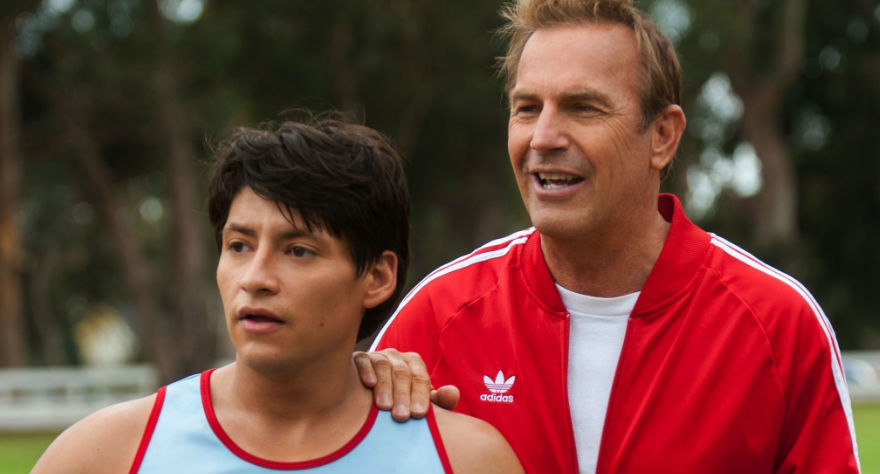
A good-intentioned youth-sports movie and yet another minority tale told from a white man's perspective.

A good-intentioned youth-sports movie and yet another minority tale told from a white man's perspective.
Hollywood’s latest entry in the popular “white-man-tells-minority-story” genre of cinema is McFarland, USA, a characteristically offensive, formulaic, and yet rousing and inspirational youth sports movie. It’s based on an incredible true story about a Latino high-school running team from the titular California town who overcame the odds and bested other, infinitely more privileged schools in a state-wide cross-country meet. This movie isn’t about the boys on the team, though. No, that would make too much sense. It’s actually a culture-clash movie about their coach, Jim White (Kevin Costner), learning that Latinos are just as good as white people, just culturally different. Again, just like in Dances With Wolves and the recent Black or White, Costner acts as tour guide through the wonderful world of the poor minorities for ignorant white America. And again, it makes me sick to my stomach.
The thoughtlessness of making the white coach the main character of the story is the film’s only major flaw, however. On every other level, it’s actually pretty decent and at some points deeply affecting. It’s predictable, plainly-shot, and written too broadly, but there are some really nice moments of affection and triumph throughout that almost made me let go of my Costner rage. Almost. Costner’s presence hangs over every scene, unfortunately, so while the film nicely depicts the warmth, closeness and hospitality of the impoverished town, we’re almost always seeing things through coach White’s eyes. Director Niki Caro and screenwriter Grant Thompson approach the material with empathy and good intentions, but the film should have been from the perspective of the boys on the team, and though Costner’s performance is very good, his omnipresence weighs everything else down.
The film opens in 1987 with White being fired from his lucrative football coaching gig in Boise, Idaho, packing up his wife (Maria Bello) and two daughters (Morgan Saylor, Elsie Fisher), and relocating to dusty McFarland, an agricultural, tight-knit Mexican-American community that isn’t exactly the California dreamland the Whites envisioned. Their first night in town, they head to a local taqueria for dinner and stare quizzically at the menu. “Don’t you have a burger?” White asks. Ha. Ha. The film is full of unnecessary gringo jokes like this that range from irksome to funny for unintended reasons. I’ve seen clueless white people try to navigate minority neighborhoods before, and yes, it’s hilarious, but let’s not forget that this story should be about the outstanding boys on the running team, not the misadventures of Mr. Blanco.
But alas, it’s in White’s shoes we stay. He takes a job at the local high school as a P.E. teacher, and when he notices that several of his students are speedsters on the race track, he convinces the school principal (Valente Rodriguez) to let him form McFarland’s first cross-country team. Thomas (Carlos Pratts) is the most gifted runner, though he’s more of a lone wolf than a team player due to drama at home. The rest of the kids are similarly archetypal, and though we do get to spend some time with them sans-White in spurts, we never get a good long look at who they really are on the inside. Their characters are loosely defined at the outset, but as the story unfolds none of their arcs go anywhere, save for Danny Diaz (Ramiro Rodruguez), the overweight, but big-hearted weak link of the team who predictably exceeds everybody’s expectations by film’s end.
The best thing about the film is its depiction of the McFarland community. From White’s abuelita neighbor giving him a chicken as a welcome gift, to the town coming together to give White’s daughter the best quinceañera ever, the generous, family-driven nature of the Mexican-American culture is represented with the utmost respect and authenticity. It’s incredibly touching to see, especially when you’ve experienced Mexican hospitality yourself and know there’s no hyperbole involved in the film’s portrayal. McFarland’s dire economic climate that limits the boys’ options post-high-school is represented as well, making the strong, loving bond between the townsfolk and their families that much more admirable.
The shameful fact that Costner dominates a movie with a hispanic ensemble cast is no fault of his own (blame the writers for that). He’s a true veteran and knows what he’s doing every step of the way, communicating big emotions with a flick of the wrist. The other standout is Pratts, whose gravitas outweighs his modest frame. He and Costner create an intense dynamic that comes across wonderfully on screen. As for the rest of the cast, their situation is the same across the board: they all do a good job, but they’re given too little material to do a great job. Again, the writers’ fault, not theirs.
The grand finale is, well, pretty grand. We all know where the story is going from the get-go, but the way the final race is filmed and edited is excellent. The urge to cheer them on after all of their hard work is irresistible, and when you see the determined Danny Diaz push himself beyond his limits, your eyes are bound to leak a bit (okay, maybe more than a bit). But let’s rewind for a second, to right before the race begins, when the teams from each school are gathered to sing the national anthem. The sound of the crowd drowns out, singling out coach White’s voice singing, “…and the hooooome of the braaaaave” as he stares at his team with pride, thinking about all they’ve taught him and accomplished. It’s like some sort of patriotic, eye-opening acid trip. These hard-working kids deserve to win, goddammit! You know what they really deserve? A movie of their own.